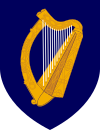 |
|---|
In Ireland, direct elections by universal suffrage are used for the President, the ceremonial head of state; for Dáil Éireann, the house of representatives of the Oireachtas or parliament; for the European Parliament; and for local government. All elections use proportional representation by means of the single transferable vote (PR-STV) in constituencies returning three or more members, except that the presidential election and by-elections use the single-winner analogue of STV, elsewhere called instant-runoff voting or the alternative vote. Members of Seanad Éireann, the second house of the Oireachtas, are partly nominated, partly indirectly elected, and partly elected by graduates of particular universities.
Coalition governments have been the norm since 1989. Fine Gael (or its predecessor Cumann na nGaedheal) or Fianna Fáil have led every government since independence in 1922. The current government is a coalition of Fianna Fáil, Fine Gael and the Green Party. Traditionally, the Labour Party was the third party, although since 2016 it has been surpassed by Sinn Féin, and since 2020 by the Green Party. Smaller parties and independents exist in the Dáil and more so in local government.
Since 2023, electoral operations and oversight of electoral integrity have been carried out by an independent Electoral Commission.